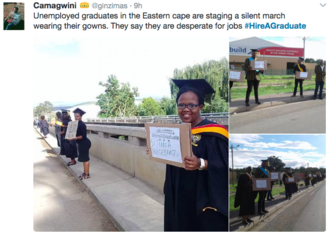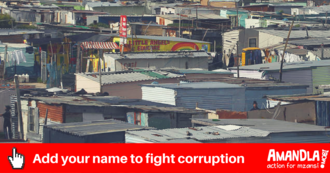- Featured
- Clean air
- Climate justice
- Consumer Rights
- Corporate Accountability
- Data access
- Early Childhood Development
- Economic fairness
- Education
- Electoral fairness
- Environmental justice
- Food justice
- Gender based violence
- Grants/social assistance
- Health
- Housing and infrastructure
- Industry interference
- Land Justice
- LGBTQIA+ rights
- Media/ information access
- Public transport
- Racism
- Reparations
- Safety
- Sanitation
- Service Delivery
- Sexual and Reproductive Rights
- Social justice
- Unemployment
- Womxn's rights/ gender equality
- Workers' rights
- More
-
Life Orientation must not be scrapped in Grades 10-12Learners need LO in Gr 10-12 and many benefit a great deal from this vital subject. The Minister made the promise in 2015 that LO will not be scrapped, but strengthened. So don''t break this promise! The implications of taking out LO will mean that teachers will not specialise in LO at universities if it is a small subject that only goes to grade 9. It will mean the end of the subject. There are many great LO teachers who are devastated. Learners only take career ed seriously in Grades 11-12. LO teachers are heartbroken at the sad news of history usurping LO. This was not a democratic decision not were LO experts consulted. To pit one subject against the other is unwise. Instead, the Department can create a subject called which can include African history and herstory, African role models and Governance, Constitution, Voting, Human Rights, etc. LO topics are vital to learners in Grades 10-12, they give in-depth career education, sexuality education, create awareness on gender issues, improve study and exam writing skills, stress management, substance abuse, environmental protection and relationships, diversity and self-esteem enhancement. They also promote Indigenous Games. [1] Motshekga defends life orientation, The New Age. 15 Feb 2017.2,353 of 3,000 SignaturesCreated by Edna Rooth
-
Tell the City of Cape Town that we reject the budget and privatization of waterCape Town is being used as an international social experiment. Yes there is a drought but 'day zero' is a deliberate lie to justify the rapid privatization of water. The City used a formula that assumed it would not rain; it assumed that it would be windy and hot every day; they failed to consider that large agriculture was abusing water; day zero was flawed from the beginning. Now the international banks are using Cape Town to threaten other cities in SA and the rest of the world, to privatize water. That is why we need to join hands to stop the privatization of water in Cape Town * over 260 000 families (almost half of Cape Town) has already had water management devices forced onto us. * these limit the amount of water that households can use per day * the city aims to change to pre-paid water; in other words, no money, no water; they have already introduced this in parts of Grabouw *currently the real cost of water provision is R6 per kl; the City has increased this by 500% and want to increase it by a further 27-87 %. They want to charge high tariffs for water so the large banks can make pots of money. *the City wants to borrow from international banks for large scale projects such as desalination; the major part of the water budget will go to desalination, about R7.4 bn. In other words, the international banks will make profits out of water. Desalination puts our water into private hands, for profits; desalinated water has caused the death rate from heart attacks to double; it also makes fruit less nutritious. * just as the national govt increased electricity prices by 20% per year, the City wants to do the same with water. * many of the water management devices (over 16%) are defective; they are leaking and shut off, leaving thousands without water for basic needs; * many are getting huge bills of thousands and sometimes hundreds of thousands of Rands. *pressure is reduced in the pipes during the times that people need water; thousands are without water. *the City and other levels of govt knew more than 10 years ago they had to adopt water saving measures such as using recycled water for sanitation; they knew they had to recycle water for recharging aquifers; they knew they had to fix the infrastructure (the City loses 100 million litres per day through leaks). They failed. If we do not stop the privatization of water, the same high tariffs and poisonous desalination will be forced on more communities in SA and around the globe. The next generations will be paying huge tariffs for water. If you have no money, you will have no water. People will die as a result. The City must be stopped. The Water Crisis Coalition is marching to the City and to parliament on the 25th April 2018 at 10am from Keizergracht , at the end of Darling Street, opposite the castle. We want to hand over all signatures and petitions. We invite you to print copies of our petition and to bring them along on the day. Copies can be obtained via [email protected] Some useful references: Proof that Day zero formula was fake: https://drive.google.com/file/d/0B2Fo95AHFCN2bGdGWU1uajRHcDMxVFZUdFFObFU4djhuWFg0/view?usp=sharing Here is the downloadable leaflet which can be used as a free train ticket on the 25th April 2018, for the march. https://drive.google.com/file/d/0B2Fo95AHFCN2aThmWFRrdHZvYUhCNXp0ejFvX3piNHU3eVRZ/view?usp=sharing Joint Saftu-Water Crisis Coalition memorandum handed to the City on our demands on water 12 April 2018 https://drive.google.com/file/d/1xLVvvmRPzUZKJWFBxwGphhGFItJF6W0-/view?usp=sharing Downloadable petition which we will hand over to the Mayor on the 25th April 2018. Why not sign up your community or workplace? https://drive.google.com/file/d/0B2Fo95AHFCN2VVQ0OWYtSGNIWkNDeXVBWk9lcDk5ZFU5MVU4/view?usp=sharing Thesis on some of the 70 springs around Table Mountain https://etd.uwc.ac.za/bitstream/handle/11394/2686/Wu_MPHIL_2009.pdf?sequence=1&isAllowed=y Now the City wants to reduce the collection points for water at Newlands from 32 to 16. Let us march against this madness. Open the springs now. https://m.facebook.com/groups/320668791777159?view=permalink&id=355469214963783 Call by Reclaim Camissa on the need to preserve our springs http://thegreentimes.co.za/calling-government-conserve-groundwater-springs/ Reclaim Camissa site www.reclaimcamissa.org www.facebook.com/RECLAIMCAMISSA/ http://twitter.com/ReclaimCamissa There are a number of other petitions against the budget. We are not in competition with any of them but wish to bring our perspective forward. If you are not comfortable with signing our petition, here is a site which you can consider: https://www.dearcapetown.co.za/coct-budget/3,441 of 4,000 SignaturesCreated by Water Crisis Coalition
-
Provide basic services to informal settlements“When we think about using the toilet, we feel dirty. We feel like we don’t have human dignity, but we have nowhere else to live, so we just have to make the best of it. This is why we are building our own toilets.” Margret Mabene, Mzondi resident. Just recently, reports surfaced that people living in Mzondi informal settlement, Ivory Park, had started a crowdfund so that they could build toilets [1]. This desperation exists across many informal settlements that are scattered across South Africa's cities. Despite this, many people living in informal settlements are overlooked in service provision. There is a growing demand for living space around cities, and South Africa has housing backlogs. People living in informal settlements have rights. The need to grant them access to water and sanitation is a human rights issue. South Africa has the laws that force municipalities to provide basic services. Abahlali BaseMjondolo, in their Harry Gwala court case against the City of Ekurhuleni, are a good example of how people living in informal settlements have used the law to defend their rights. In this case, the people successfully argued that Ekurhuleni had a statutory obligation in terms of the Water Services Act, which requires a safe albeit temporary toilet for each stand, including in informal settlements [2]. It is important for ordinary South Africans to stand in solidarity with those who are marginalised. This is important for the advancement of justice and equity, ideals that are enshried in our Constitution. People living in informal settlements deserve dignity, like all human beings, irrespective of their material condition. [1] Community tries crowd funding to get toilets, Zoe Postman for GroundUp News. March 13, 2018. [2] The right to basic services in informal settlements: Notes on Harry Gwala High Court hearing 12 December 2008, Abahlali BaseMjondolo. Dec 15, 2008.5 of 100 SignaturesCreated by Amandla.mobi Member
-
Implement a 'time of use' tariff for electricityCellphone operators have peak and off peak tariffs. Eskom does the same, but for big businesses if they spend R500 000 or more on electricity per month. As ordinary citizens, we demand that Eskom extends the same courtesy to us in allowing us the freedom to choose when and how we use electricity. Our government says that electricity is a commodity and its price is constant. But the price is not constant. It changes almost every second of the day. Yet our government suggests that we are stupid and that we won’t be able to work with varying electricity charges, for example a normal rate of R1.50 per kWh, a peak rate of R3 per kWh and an off peak rate of 75 cents per kWh. Off peak time is 10pm to 6am. It is entirely possible for consumers to only use electricity at off peak time and to actually sell electricity at peak time to people who want to buy it at those times, and who can make their own decisions about what they are prepared to pay to have the convenience of electricity at peak time, and during the day. But we are constrained by the government, even though there are many businesses who want to buy more electricity and wealthy people who want to buy more electricity and mines, smelters, and so forth, who want to buy more electricity. The government also blames the fact that a 21st Century grid needs smarter metering, yet it says that we consumers cannot buy our own meters and that the meters must be paid for by government. But government gets its money from the consumer, so the consumer is paying this price regardless of whether government pays for it or the consumer pays for it. This is yet another paradox in electricity pricing.10 of 100 SignaturesCreated by Amandla.mobi Member
-
Scrap the MPRDA Act of 2002 and its amendmentsThe MPRDA of 2002, even though it was later amended, still does not afford any opportunity for consultation with and consent by communities as prescribed in Free Prior and Informed Consent(FPIC). This infringes on the rights of communities to influence decisions about old and new mining in their areas. It contains limited rights on community consultations (It only addressed mitigation of environmental impacts). Communities are still not given space to negotiate the contents of the old and new rights. The MPRDA of 2002 also separates the surface rights from the mineral rights, and converted old order rights of mining companies to mine on communal land to new ones without consulting communities to listen to their views. The Act states that the conversion is automatically granted for as long as the company can show that it has a Black Economic Empowerment (BEE) partner and that the Municipality has agreed to a social labour plan providing for housing and local economic development plans. Once this has been checked, new mining can happen without any consent by the community. All that is required under section 5(a) is a 21 days written notice before mining commences. This cannot be right.1 of 100 SignaturesCreated by Land Access Movement of South Africa
-
Protect Customary Land RightsThe Constitution recognises the informal or customary rights of people living in the former homelands yet the Department of Rural Development and Land Reform has failed to legislate a communal land rights law that will strengthen and protect these rights. As a result; * Big cooperates are grabbing land in the communal land without any compensation for loss citing development. * Nature of individuals and family rights within a broader community are not clarified, and overshadowed by majority in the community. * People are not adequately compensated when land is sold or awarded for big developments * Consultation and Consent of land occupiers is not respected because of the weak nature of the rights provided by current law. In 1996, Parliament passed the Interim Protection of Informal Land Rights Act (IPILRA) to provide protection for all people living on communal land in the former Bantustans, people living on trust land, people who previously had Permissions to Occupy (PTOs) and anyone living on land uninterrupted since 1997 “as if they were the owner”. This was a big milestone in the protection and recognition of customary land rights and the empowerment of families to be part of bargaining and negotiations of any socio-economic development happening in their land. Although people are protected by IPILRA, the fact that it is temporary and can be renewed annually, deprives people of their rights to say NO to development that disadvantages them. This makes it easy for "developers" or Government to easily expropriate the land. It is also worth noting that the law also states that the Minister of Rural Development and Land Reform can make regulations in terms of IPILRA to provide more detailed processes and procedures.83 of 100 SignaturesCreated by Alliance for Rural Democracy
-
Stop the Traditional Leadership and Khoisan Bill as it currently stands.Any law that seeks to facilitate recognition of previously marginalised group or any development of land belonging to the people must ensure that community consultation and consent is at the centre. The TKLB closes down that space and excludes ordinary people from being consulted and give consent on decisions that will affect their lives. There needs to be meaningful public participation. As it stands, the TKLB only highlights consultations with high profile structures such as the House of Traditional Leaders, royal families and traditional councils and there is no mention of rural citizens who are land buyers and customary land rights users. The TKLB supports rural elites' access to wealth and resources. It does not put in place mechanisms that holds leaders accountable to their people. The discovery of mineral wealth in the land that was once considered dry and not productive has brought about disputes where people’s peace is disrupted by big mining companies, and when people react they are suppressed and criminalized.26 of 100 SignaturesCreated by Alliance for Rural Democracy
-
Revoke Enviroserv Shongweni Landfill LicenceEnviroserv has been in the news a lot lately for their toxic waste landfill site, which has angered the residents of Shongweni. But Enviroserv’s crimes are not only limited to those in the current new cycle. They have been polluting in black communities, such as Ntshongweni, Dassenhoek, KwaNdengezi, Buxfarm and Cliffdale, for over 15 years and have left struggling communities with a mountain of health issues including; headaches, fatigue and nose bleeds. There is has been no science-specific research that measures the long term impacts of Enviroserv’s pollution and the health issues experienced by communities. A targeted surveillance system that maps out the social, health and environmental impacts created by hazardous waste needs to be developed to avoid far more serious health issues like cancer in the future. Enviroserv’s legal appeal process that is challenging DEA’s decision to suspend their operations license, sends a clear message that Enviroserv thinks our lives are cheap and that profit matters more to them then our health, environment and quality of life. EnviroServ is ignoring our constitutional rights and the increased incidence of illnesses apparently related to the foul odour, not to mention the psychological effects living in the stench of a toxic landfill is having on us. By refusing to tell us what is going into the landfill and what its possible toxic effects on humans are, you are only serving to increase our fear that the health effects are being caused by the hazardous, ineffectively or untreated waste being accepted at the landfill.30 of 100 SignaturesCreated by Amandla.mobi Member
-
SA Says NO to Monsanto's bogus drought tolerant GMO maize and toxic glyphosateWe are deeply troubled by the continuous introduction of risky GMOs into our food and farming systems. Since its introduction into our food system in 1998, it has done nothing to address our nation’s hunger problems. Instead, we are left with polluted soil and water and loss of our superior, local farmer-bred varieties of maize. We are also extremely concerned about the political economy of seed control that Monsanto has imposed on our seed system, which utterly undermines our food sovereignty and breeds a dependency on Monsanto's industrial systems and technologies. Local land belonging to smallholder farmers in SA have already been contaminated. More GMOs will only exacerbate this situation and further erode farmers’ seed systems. We call on our government to reject Monsanto’s application and begin a real dialogue with South Africans to transition out of industrial and GM-based agriculture systems and work towards real climate resilient solutions that are ecologically sustainable, socially just and takes care of the nutritional needs of all South Africans23,634 of 25,000 SignaturesCreated by African Centre for Biodiversity

-
Hire a graduate, even if they don't have experienceWe can't get jobs because we lack experience, we are suffering.1,201 of 2,000 SignaturesCreated by Phumelele Hlongwane
-
Declare OR TAMBO hailstorm affected areas as distaster areasOn Monday the 2nd of January 2017, a number of areas including the Qweqwe, Payne, Zimbane, Maqhinebeni, VIdgiesville, Mqanduli and the surrounding areas were hit by a severe hailstorm which left many desitute and homeless [1]. Homes, schools and churches were severely damaged and a number of people were rushed to hospital with injuries. During this time of the year this kind of weather uis expected and it is deeply worrying that everytime our Municipality is caught off guard with no contingency plan. We know that it is norm for Disaster Management to delay responding to these disasters even though they have a set budget for such. This is evident even in this case, there has not been any statement issued to declare or any information to give guidance to the affected communities like a toll free number or contact offices/persons We however, commend the Department of Health for being visible and issuing a media statement going as far as offering assistance to those injured. [1] Lightining strikes Seven people in Mthatha, Jenni Evans, News24196 of 200 SignaturesCreated by Fungiwe Ntleki
-
Fight corruption, demand transparent service delivery in [put the name of your municipality here]We can improve service delivery and fight corruption in our Municipality by ensuring all Service Delivery Agreements (SDAs) are public and easily accessible to all. Some politicians, officials and businesses are scared about transparency, but if they aren't doing anything wrong, what have they got to hide. * This campaign by amandla.mobi is supported by Heinrich Böll Stiftung.10 of 100 SignaturesCreated by Vusi Sodiye
.png)

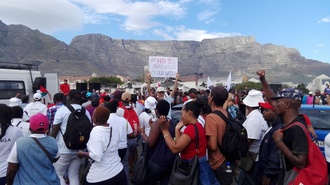
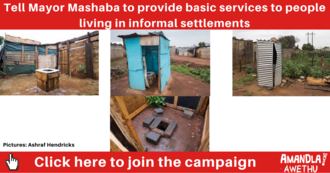.png)

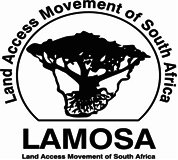


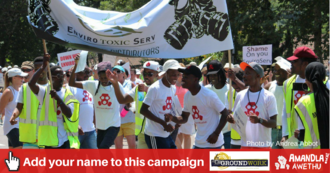
.jpg)
